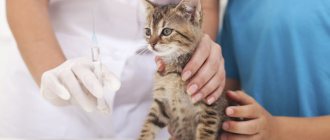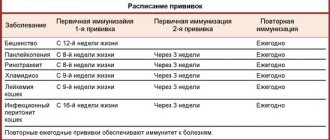Unfortunately, kittens often die due to various diseases, and the main reason for this is the lack of vaccinations. After all, vaccination is an opportunity to avoid contracting a viral or microbial infection.
That is why it will be useful for every owner to learn how to prepare for vaccination, which drug to choose, and how to cope with possible complications.
Do cats need vaccinations?
The answer is clear - it is necessary. This way the owner will protect the animal from a number of health problems. But the risk of getting a bacterial or viral infection remains.
Prejudice against vaccination:
- Domestic cats do not need to be vaccinated;
- outbred animals have strong immunity;
- kittens from the nursery do not need vaccinations;
- A purebred cat does not need vaccination if it does not participate in competitions and exhibitions.
The mistaken position of pet owners is not to vaccinate their kitten because it lives at home and does not go outside. They forget that harmful microorganisms can enter the apartment on shoes and outerwear.
Expert opinion
Chepa Natalya Semenovna
Veterinarian
Ask an expert
How else can a domestic cat become infected with a dangerous infection? For example, an animal fell out of a window or ran out of an apartment. Often such a cat can spend several days outside or in the basement before its owner finds it, this is enough time for infection. The likelihood of coming into contact with a sick animal is also high when visiting a veterinary clinic. Please note that your veterinarian has the right to refuse to accept a cat that has not been vaccinated against rabies. By law, owners are required to vaccinate their pets against rabies annually, regardless of their living conditions.
The second myth is that street kittens have strong immunity, their body will successfully fight off any infection. In fact, outdoor cats are even more susceptible to attack by viruses or bacteria. No one is giving them vaccines. Kittens become infected in the womb or after birth through their mother's milk.
Important! The lifespan of outdoor cats and cats is 50–70% less than indoor cats. They are susceptible to attacks from stray dogs and irresponsible people, get poisoned after preventative treatment of basements by housing and communal services, and die from infections due to lack of vaccination.
A cat from a cattery may not be vaccinated. It is important to check how honestly the organization’s employees do their job of caring for the animals and whether they take care of the kitten’s first vaccination. If he was given to a family without a veterinary passport, this is the first sign of dishonesty among the nursery workers.
Important! The veterinary passport serves as the only proof of vaccination of the animal. The document must have the appropriate stamps and the dates of vaccinations given.
The vaccination schedule is the same for everyone. First, the required complex vaccine is selected. Then an appointment with the doctor is scheduled and the vaccine is given. After 3 weeks, revaccination is done to consolidate the result and improve the body’s adaptation.
This is true for both purebred and outbred animals. Persian kittens receive the same vaccinations as regular street kittens.
First-class kitten vaccinations
When kittens are fed by a cat's milk and colostrum, the mother's antibodies help protect them from infections. But after about six weeks from birth and transition to solid food, it is time for them to be vaccinated. Kittens need several vaccines during their first year to protect them from serious diseases. After this, they will only need annual booster vaccinations.
The specific veterinary advice your kitten will receive will depend on where you live, whether your cat will roam around the neighborhood or stay indoors, and whether you have other cats. Always follow your veterinarian's advice.
Without what vaccinations will a cat not be allowed abroad?
Owners will not be allowed to transport a cat across state borders without mandatory vaccinations:
- from rabies;
- viral leukemia;
- panleukopenia;
- viral nature of immunodeficiency;
- rhinotracheitis;
- calcivirosis;
- infectious peritonitis;
- mycosis.
A kitten and any other animal must have an initial rabies vaccination one month before departure on a trip.
Important! The disease called “panleukopenia” has a popular name – “distemper”.
Recommended vaccination schedule for kittens
First visit to the clinic (6 to 8 weeks).
- Analysis of feces for parasites
- Blood test for feline leukemia
- Vaccination against rhinotracheitis, calcivirus, panleukopenia and chlamydia
- Discuss nutrition and care with your doctor
- Second visit (12 weeks). Examination and clinical testing for parasites. Second vaccination against rhinotracheitis, calcivirus and panleukopenia. First vaccine against feline leukemia
- Third visit (time as recommended by your veterinarian)
- revaccination against feline leukemia
- rabies vaccine
- Six months. Planned sterilization of a cat or castration of a cat
When not to vaccinate
According to the unified veterinary protocol, the first vaccination is canceled if at least one factor from the list is present:
- chronic, acute or subacute disease;
- high temperature - more than 39.2°C degrees;
- exhaustion;
- dehydration;
- suspected immunodeficiency or confirmed diagnosis;
- the animal is less than 8 weeks old;
- recent injection of hyperimmune serum - less than 3 weeks ago;
- helminthiasis or infection with other parasites;
- lack of preliminary deworming;
- recent surgery – less than 2–3 months.
Domestic cats are not vaccinated if they are pregnant. The period of estrus begins at approximately 6–7 months. For some, earlier – from the 5th month. The first vaccination does not affect the health of the kitten if the animal is in heat or on a cat spree. As for the period of change of baby teeth, veterinarians have a mixed opinion.
Important! The main reason for doctors’ refusal to carry out primary vaccination on schedule is the weakened immunity of cats.
Learn about essential drugs in animals
- Use of Dirofen in cats
- Instructions for using Vetom in cats
- Instructions for using multifel in cats
- Instructions for use of fosprenil in cats
- Kotervin in cats
- Instructions for use Kot Bayun in cats
- Instructions for the use of feliferon in cats
- Stronghold in cats
- Instructions for use of Milbemax in cats
- Provides information about the drug gamavit
- Instructions for the use of spirovet in animals
- Instructions for use of tiamulin
- Instructions for use of Sevaxel in animals
- Instructions for use of thiam-oxy in animals
- Instructions for use of tetravet
- Application of TAF 25% in chickens
- Use of cefkinome in animals
- Instructions for the use of intramycin in animals
- Instructions for the use of inotil in animals. Calculate the optimal dose of the drug in dogs, cats, pigs, cows, sheep, goats
- Instructions for use of cobactan in dogs
- Instructions for the use of coliside in animals. Calculate the optimal dose of the drug in birds, pigs, cows, sheep, goats
- Instructions for the use of Marbox in animals. Calculate the optimal dose of the drug in dogs, cats, pigs, cows, sheep, goats
- Instructions for the use of inosel in animals. Calculate the optimal dose of the drug in dogs
- Instructions for the use of oxytetra in animals
^Top
When do kittens get their first vaccination?
Kittens are first vaccinated at the age of 2–3 months. If the babies were fed exclusively with mother's milk, and the cat itself is relatively healthy, you can start vaccinating a month later.
Kittens are vaccinated in 2 stages:
- a set of serums against various diseases (without rabies);
- after 21 days with anti-rabies serum (against rabies and other infections).
The immunity program begins to develop completely independently from the 2-3rd month. Until this time, the protection that babies received from mother's milk will remain in effect. Veterinarians call it “colostral (passive) immunity.”
Important! Rabies vaccinations can be done no earlier than 3 months (12 weeks).
Approximate kitten vaccination schedule
- 2 months - panleukopenia, rhinotracheitis, calicivirosis
- 3 months - panleukopenia, rhinotracheitis, calicivirosis (revaccination) + rabies at the age of 1,2, 3…. etc. — revaccination against panleukopenia, rhinotracheitis, calicivirus and rabies + additionally against leukemia, dermatomycosis (optional).
Recommendation of non-core vaccines depends on the geographic location, epidemiological situation, and your kitten's environment. Talk to your veterinarian about your kitten's potential exposure.
Each veterinarian has specific preferences regarding the order and frequency of additional procedures such as examinations, deworming and testing. Talk to your veterinarian about the best schedule for your kitten.
Vaccination table for cats by age
Vaccination table for cats under 1 year of age:
| Diseases | Kitten age, weeks | ||
| Primary vaccination | Revaccination through: | Routine vaccination | |
| Calcivirosis Panleukopenia Rhinotracheitis | 8–12 | 2–4 | 1 time per year |
| Chlamydia | 9–12 | 2–4 | 1 time per year |
| Trichophytosis, microsporia (ringworm). | 8–12 | 10 | 1 time per year |
| Rabies | 8–12 | – | Once every 3 years |
| Infectious peritonitis | 16 | 20 | 1 time per year |
The vaccination protocol allows for the addition of another vaccination for preventive purposes - against chlamydia. Duration: 2 weeks after the main procedure. In subsequent years, rabies vaccinations should be given only if the animal goes outside.
How to prepare an animal for vaccination
A kitten or adult cat needs to be prepared before vaccination. About two weeks later, anthelmintic treatment is carried out (a tablet or a drop on the withers), as well as cleaning from other parasites (for example, fleas). Before primary vaccination, it is better to carry out anthelmintic treatment twice at intervals of a week. According to the same scheme, the cat is prepared before each subsequent revaccination.
When do kittens change teeth: symptoms and at what age
Contraindications to vaccination:
- cat pregnancy;
- lactation period;
- age up to two months;
- teething;
- postoperative period;
- presence of parasites.
Before the procedure, the pet must be healthy and active, have a good appetite and normal bowel movements.
Important! Before primary vaccination, it is advisable to provide the kitten with quarantine conditions.
Which vaccines to choose
List of vaccines for cats and kittens:
- Purevax.
- Nobivak.
- Multifrel.
- Leucorifelin.
- Quadricate.
- Fort Dodge Fel-o-Wax IV.
- Rabizin.
- Felocel.
- Leucocel.
- Microderm.
- Felovax.
Today, the first 2 vaccines on the list are considered universal, effective and extremely safe. In second place are Felovax and Multifrel.
Table of vaccine characteristics using Nobivak as an example:
| Name | Diseases | Kitten age |
| Nobivak Forcat (multicomponent) | Calcivirosis Rhinotracheitis Panleukopenia Chlamydia | from 8 weeks |
| Nobivac Tricat (triple protection of immunity against viruses) | Calcivirosis Rhinotracheitis Panleukopenia | 8–12 weeks |
| Nobivac Rabies | Rabies | 12 weeks |
Important! Nobivak Rabies can be mixed with other Nobivak vaccines.
How to prepare a cat for vaccinations
Step-by-step scheme for preparing cats for vaccination:
- Eliminating fleas - they are carriers of helminths. The animal bites the flea, swallows the microscopic eggs of the parasite and becomes infected.
- Deworming 1–2 weeks before the procedure.
- Examination on the day of the procedure - the doctor measures the temperature, checks the oral cavity and conjunctiva of the eyes for the presence or absence of inflammation.
Note! If before scheduled vaccination the cat had contact with an infected animal, vaccination is postponed for 14 days.
Care after vaccination
Rules for caring for a kitten after vaccination:
- Protect the animal from stress, drafts, and injuries.
- Do not bathe for 3–4 days.
- Do not overload with active games for several days.
- Do not overfeed.
Important! After a preventive or routine vaccination, you should not leave the clinic immediately. You need to wait 15 minutes. During this time, the doctor will observe the animal. If there is no acute allergic reaction, you can go home.
Age for rabies vaccination
Immunization against rabies is carried out for the baby at the age when communication with other animals begins (at about 3 months).
In cases where the cat practically does not communicate with its relatives, the vaccine is administered at 6-8 months of age.
Re-vaccination is carried out annually at approximately the same period.
Usually, an anti-rabies injection has a strong effect; as a result, after vaccination, the baby becomes lethargic and weak, in addition, the temperature rises for a couple of hours.
Possible complications after vaccination
In most cases of cat immunization, no serious side effects are reported after vaccination. Usually the entire period of antibody production proceeds without problems. But doctors emphasize that everything is individual.
After routine vaccination, cats may experience:
- lethargy;
- loss of appetite;
- anxiety;
- infrequent sneezing;
- swelling at the injection site;
- anxiety;
- drowsiness;
- fever;
- slight increase in temperature;
- allergic reactions;
- inflammation of the subcutaneous cellular structure (removed only surgically).
Note! Since January 2022, all veterinarians have been following a single protocol - before the procedure, they notify cat owners about changes to the vaccination regulations. Now the vaccine is placed not in the withers, but in the muscle of the hind leg. This precaution allows us to exclude the development of malignant neoplasms in the lungs (sarcoma), which over the past 2–3 years have often been recorded precisely after vaccination at the withers.
Schedule of vaccinations that need to be done before one year: calendar and list with description
Vaccination, carried out in the first year of life, begins in the maternity hospital, on the first day after birth. To ensure effective immunization, some vaccinations are given multiple times at different ages. In addition to the legally approved mandatory vaccines, there are additional ones that can be administered to the child at the request of the parents: against chickenpox, hepatitis A and, during epidemics, against encephalitis and influenza.
Table of vaccinations given to children under one year old, by month
| Children's age | Vaccine |
| The first day after birth | Viral hepatitis B – primary |
| 3-7 days of life | BCG-M (tuberculosis) |
| First month | Viral hepatitis B – again |
| Second month | Viral hepatitis B – third time for children at risk Pneumococcal infection – primary |
| Third month | Whooping cough, tetanus, diphtheria and polio (inactivated vaccine) – primary |
| Fourth and fifth months | Whooping cough, tetanus, diphtheria and polio (inactivated vaccine) - repeated Pneumococcal infection - repeated |
| Sixth month | Whooping cough, tetanus, diphtheria and polio (“live” vaccine) – third time Viral hepatitis B – third time |
| Twelfth month | Mumps (“mumps”), measles, rubella – primary |
Description of the vaccination scheme
- Viral hepatitis B
The disease affects the liver, causing complications in the form of cirrhosis. The drug against it includes proteins of the hepatitis B virus. Procedures carried out in the first year of life protect the body from the disease for up to 8 years. For children who are at risk for this disease (mothers are carriers of the virus or have hepatitis B), an accelerated vaccination schedule is provided, which involves a fourth procedure. Possible reactions: increase in body temperature to 37.5℃, redness in the injection area.
- BCG-M (tuberculosis)
The disease affects the lungs and causes complications in the brain and bones. The drug to protect against it contains bovine tuberculosis bacteria (weakened, which do not cause disease in humans). A single procedure protects for up to 7 years. In case of weakened immunity (according to the Mantoux reaction), repeat vaccination is included in the schedule after a year. A delayed reaction may manifest itself as a lump at the injection site, leaving a small scar at the site.
- DTP (tetanus, whooping cough, diphtheria)
Diseases that have a very high mortality rate among newborns are dangerous due to the toxins produced by pathogens. The complex preparation contains a low concentration of tetanus and diphtheria toxins, as well as an inactive whooping cough bacillus. After the injection, local redness and thickening of the skin, as well as an increase in body temperature to 38℃, drowsiness or excessive excitability, and malaise are possible.
- Polio
Affects the central nervous system, gastrointestinal tract, endocrine system, is characterized by high mortality, and can lead to paralysis. Inactivated drugs against the disease contain only viral proteins, while “live” drugs contain a weakened virus. Immunity develops up to 10 years. There may be redness and thickening at the injection site. If the drug is given orally, there are almost no reactions, with the exception of allergies in the form of skin rashes.
- Rubella, measles, mumps (“mumps”)
The disease is dangerous due to its complications and severe course. Preventive drugs against them contain weakened pathogens (viruses) that cause a 100% immune response, but do not lead to infection of other people. Immunity develops up to 5 years. After the procedure, the following are possible: increased body temperature, enlarged lymph nodes, redness of the cheeks and eyes, nasal congestion.
- Pneumococcal infection
It is a complex of diseases that are caused by the bacterium Streptococcus pneumoniae. These include acute otitis media, pneumococcal pneumonia, purulent pneumococcal meningitis, arthritis, endocarditis, and pleurisy. Usually this infection acts as a complication of others. Previously, children were vaccinated against the listed diseases for a fee.
Where is it better to vaccinate a kitten: at home or in a clinic?
To understand where it is better to get vaccinated - at home or in a clinic - you need to consult with specialists. Veterinarians recommend that the first vaccination be done at the clinic. The doctor will have the opportunity to observe the animal’s body’s reaction to the injected serum. It will be easier and faster for him to relieve allergic symptoms on the spot. Subsequent procedures can be done at home.
Kittens can get their first vaccination from the 2nd month. This applies to all types of serums except those that protect against infectious peritonitis and ringworm.
Only healthy animals are vaccinated. Before vaccination, you need to carry out treatment against fleas and helminths. After the procedure, you cannot bathe the kitten for several days; you need to protect it from hypothermia and overwork.
How to vaccinate a kitten
The vaccination must be administered by a veterinarian. In the clinic where the owner brings the kitten, vaccines are kept at the right temperature. The doctor will quickly give an injection and enter the data into the animal’s medical record.
Veterinarians often go to your home and carry out all manipulations in the environment familiar to the animal. Owners often order outcall services to relieve their small pet from the stress of transportation.
Vaccination rules - what you shouldn’t forget
Before you go to the doctor or vaccinate yourself, you need to make sure that the baby is completely healthy and alert:
The pet must be active and alert; He must certainly have a good appetite; The cat's body temperature should be normal (in cats, normal body temperature is considered to be 38-39 degrees Celsius); The animal should not sneeze or cough; During a visit to the veterinary clinic, the doctor should once again check the cat’s health. Talk to your veterinarian about when to give your first vaccination. This depends on several factors, so only a professional can give you the right advice; Before injections, the kitten must be given anthelmintic drugs. You can vaccinate 10 days after this
It is important to choose a high-quality, proven vaccine; inexpensive, but untested options can irreparably harm your pet’s health. It is best to vaccinate kittens in veterinary clinics, where specialists can take responsibility for the life and health of the animal.
It is best to vaccinate kittens in veterinary clinics, where specialists can take responsibility for the life and health of the animal.
Vaccination rules:
Only completely healthy kittens can be vaccinated; It is forbidden to give injections to pets after contact with a sick animal; After vaccination, the pet cannot undergo surgery for 21-25 days; After surgery, the cat cannot be vaccinated for 3 weeks; After taking antibiotics, vaccination is allowed only after 14 days; The vaccine should not be given while teeth are changing; It is important that the vaccine does not expire; You cannot vaccinate an animal less than 8 weeks old; The kitten should not be in a stressful state - it should not break free from your hand, scream, etc. After vaccination, you need to monitor the kitten’s condition: is it active, what is its appetite?
After vaccination, you need to monitor the kitten’s condition: is it active, what is its appetite?
After any injection, the pet may suddenly become lethargic, lose appetite, and its body temperature may rise.
The effects of vaccination disappear within a few hours, this time depends on how strong the baby’s body is at the time of vaccination.
The most common vaccines and their features:
- Nobivac Tricat is a dry combination vaccine. It is areactogenic and creates immunity in the cat against diseases such as panleukopenia, rhinotracheitis, and calicivirus infection. Administered subcutaneously or intravenously at at least 12 weeks of age.
- “Leukorifelin” is a vaccine consisting of two parts - dry and liquid, which are mixed before administration. It is highly immunogenic. From 3 months you can administer the same drug, which also induces immunity against rabies, it is called “Quadricat”.
- “Felovax-4” is a complex vaccine that does not provide immunity against rabies. Given to kittens aged 8-12 weeks. It allows you to create immunity for a period of no more than 12 months, so you need to strictly monitor the timing of revaccinations, which should be carried out once a year.
Forgetting about vaccinations is strictly prohibited, especially if they form immunity against dangerous diseases such as rabies.
Remember that no one will vaccinate your pet better than an experienced veterinarian who knows which drug is right for your pet, how best to administer it and what dose to take.
He will tell you at what age kittens are vaccinated and will be able to carry out the vaccination correctly.
Self-medication can seriously harm your pet.
Forgetting about vaccines is also strictly prohibited, especially if they form immunity against dangerous diseases such as rabies.
Every owner must remember that vaccination cannot be carried out on a sick animal or a cat that has not taken anthelmintic drugs.
May your pet always be healthy and energetic and give you joy every day!
When to vaccinate kittens: vaccination rules
Every kitten owner should know when to vaccinate kittens, what diseases a kitten is vaccinated against in the first months of life, and what you need to know before vaccination.
List of vaccines for children aged 3 to 18 years
From 3 to 18 years of age, repeated vaccinations and revaccinations are also indicated. They are necessary because the drugs used do not provide lifelong immunity.
| Age | Vaccine |
| 6 years | Mumps (mumps), measles, rubella - revaccination |
| 6-7 years | Tetanus, diphtheria – revaccination II BCG – revaccination I |
| 13 years | Viral hepatitis B, rubella |
| 14 years | Tetanus, diphtheria – revaccination III Poliomyelitis (“live” drug) – revaccination III |
The pediatrician decides whether vaccinations can be done. He evaluates whether there are any contraindications, which include:
- allergic reaction to yeast;
- newborn weight up to 2 kg;
- allergy to egg white;
- allergy to aminoglycosides;
- primary immunodeficiency;
- acute infections in the body or exacerbation of chronic diseases;
- complications from vaccinations already given;
- seizures, some diseases of the central nervous system.










